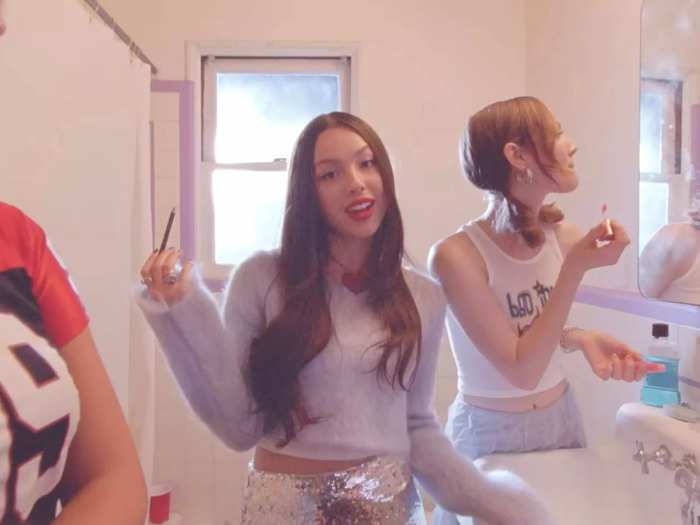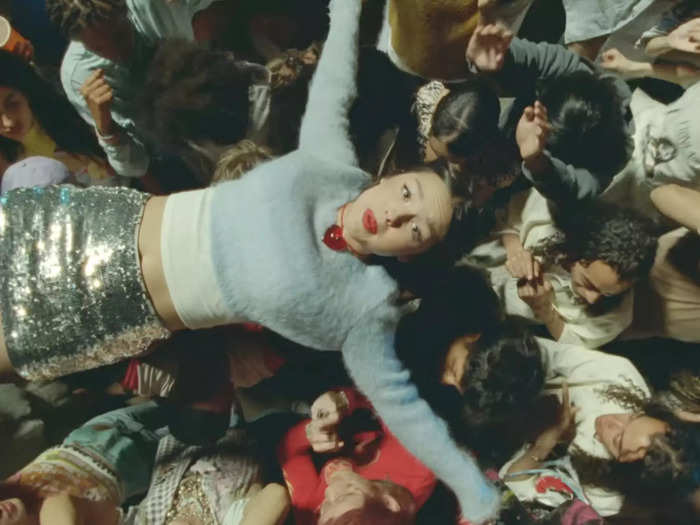- Home
- entertainment
- news
- Olivia Rodrigo's 'Guts' might be a second 'Sour,' but that doesn't make it a bad idea
Olivia Rodrigo's 'Guts' might be a second 'Sour,' but that doesn't make it a bad idea
Callie Ahlgrim,Courteney Larocca

- Olivia Rodrigo released her sophomore album, "Guts," on Friday.
- The much-anticipated follow-up to "Sour" is angrier and funnier, leaning further into rock than pop.
Olivia Rodrigo released her sophomore album, "Guts," on Friday.
Like her 2021 debut, "Sour," Rodrigo is credited as a lead songwriter on all 12 tracks, alongside her go-to producer Dan Nigro. The only other writers listed are Julia Michaels and Amy Allen, who worked on "Logical" and "Pretty Isn't Pretty," respectively.
But unlike its predecessor, "Guts" can't really be described as a breakup album.
"It's so much about growing up and finding your footing in the world," Rodrigo told The Guardian. She also told Vogue that, despite becoming a household name as a teenager, turning 20 is the most transformative event in her life thus far: "The rest of it feels minuscule compared to that."
Insider's music team (senior reporter Callie Ahlgrim and senior editor Courteney Larocca) listened to the new album on our own, jotting down our initial thoughts track by track.
Here is what we thought of each song on "Guts" upon first listen. (Skip to the end to see the only songs worth listening to and the album's final score.)
"All-American Bitch" comes out of the gate swinging.

Ahlgrim: In a conversation with Phoebe Bridgers for Interview magazine, Rodrigo revealed that "All-American Bitch" was inspired by a passage in Joan Didion's "The White Album."
The phrase appears when Didion asks two teenagers, Debbie and Jeff, why they ran away from home.
Debbie, Didion writes, "was already on probation because her mother had once taken her down to the police station and declared her incorrigible." Jeff describes his own mother as "a genuine all-American bitch."
"She was really troublesome about hair. Also she didn't like boots. It was really weird," he says.
Rodrigo's own song plays with the dichotomy of this passage: Debbie and Jeff represent the beauty of youth and rebellion, but also naivety. They villainize their mothers, the classic scapegoats, who were most likely struggling with their own demons — frustrated, hamstrung, limited by the impossible contradictions of womanhood. Expected to do the impossible and still remain pleasant.
In a breathless tirade, Rodrigo rages against the same double standards. She is "light as a feather and as stiff as a board," sensitive yet chill, classy like a Kennedy but swearing like a sailor.
The outro, delivered in her sickly sweet falsetto, ties it all together: "I'm grateful all the time / I'm sexy and I'm kind / I'm pretty when I cry." On the surface, it's a brag. In reality, it's a sneer.
Larocca: "All-American Bitch" is early-aughts-rom-com-chick-flick-Avril-Lavigne-Hannah Montana perfection and I am utterly obsessed. That first key change sent chills through my entire body the first (and the second, and the third, and the 17th) time I heard it.
A few months ago, I said to somebody that I'm surprised more artists aren't putting out Y2K-inspired music considering how much of a trend it is in every other aspect of life right now, from movie rewatches to street style. Now, here comes Rodrigo with a banger straight out of the year she was born. She just gets it.
"Bad Idea Right?" is irresistible mayhem.

Ahlgrim: "Bad Idea Right?" is the perfect example of what makes Rodrigo unique in a crowded world of pop stars.
Her extravagant delivery of lines like "I'm sensing some undertone," "I just tripped and fell into his bed," and "I'm sure I've seen much hotter men / But I really can't remember when," makes the song feel like an event.
Pressing play on "Bad Idea Right?" gives me the same kind of jolt as when my best friend sends me a juicy voice note. Fingers tingling, jaw agape. It's more than an anecdote — it's a show, a performance, and Rodrigo is gunning for that Oscar, baby.
Indeed, she told the BBC that her creative partner, Dan Nigro, will start filming her in the studio if she's not properly invested. Suddenly, the idea of an audience makes her voice come alive.
Larocca: I don't know what it is about Rodrigo's second singles that makes fans not want to stream them with such ferocity that they hit No. 1 on the Billboard Hot 100, but just like "Deja Vu," I personally can't get enough of "Bad Idea Right?" and have already streamed it 90 times since it dropped a month ago.
On its own, it's one hell of an earworm; I too can't hear my thoughts when my brain is repeating "I should probably, probably not / I should probably, probably not" all day long.
But listening to it for the first time within the confines of "Guts" was its own special experience. Rodrigo ties it to "All-American Bitch" by including a door knock at the end of the first track, on which she utters the line, "I know my age, and I act like it." "Bad Idea Right?" is no better example of that — this is the kind of irresponsible, risky behavior only a 19-year-old can sell with complete conviction.
As Julien Baker sings on boygenius' single "$20" from earlier this year: it's a bad idea, and I'm all about it.
"Vampire" is a torrid account of exploitation.

Ahlgrim: "Vampire" was a slow burn for me. It didn't knock the wind out of my chest like "Drivers License," which I heard exactly once before I sent the link to everyone in my contacts. But each time Rodrigo spit "bloodsucker, fame-fucker" into my headphones, I felt the bruises on my lungs get bigger, sorer, more purple-blue.
Before I knew it, I was losing my breath and screaming along: "You said it was true love, but wouldn't that be hard? / You can't love anyone 'cause that would mean you had a heart."
After emerging from a relationship very much scathed, sporting two punctures in her neck, Rodrigo fights back with her own flavor of gore. As Pitchfork rightly noted, "This is how you leave a guy for dead."
Larocca: I'm so glad Rodrigo ignored everyone who told her to keep "famefucker" off this song because it's the best part. Although, the bridge is also to die for.
"Lacy" grapples with the dark side of infatuation.

Ahlgrim: Rodrigo has become the latest female songwriter to serenade another woman with excruciating awe. Jolene, Betty, Amelie: meet Lacy, "the sweetest thing on this side of Hell."
Instantly, from the very first couplet, this has become one of my favorite Rodrigo tracks ever. And the delicious tension continues to build.
Throughout the song, Rodrigo describes her feelings for Lacy as all-consuming, double-edged, almost aggressive, like when you see a cute animal and instinctively clench your teeth. She describes Lacy's compliments as "bullets," her memory as "poison." Seeing her is the "sweetest torture." Does Rodrigo want to kiss Lacy or slice open her abdomen and crawl inside?
These are some of Rodrigo's best lyrics yet, weaving lust and reverence with hostility and corruption: "I despise my jealous eyes and how hard they fell for you / Yeah, I despise my rotten mind and how much it worships you."
Falling in love can always be infuriating because it requires a loss of control. But "Lacy" also speaks to a peculiar sapphic experience, in which falling in love also requires radical honesty — with yourself, with society, and possibly with loved ones.
It can be painful to plumb the hazy parts of your psyche, especially when others may react with prejudice and disapproval. But it's worthwhile, tender, and necessary work (especially when a "dazzling starlet, Bardot reincarnate" is on the line).
Larocca: This one is fascinating. You can hear Rodrigo fall harder for Lacy as the song goes on, her initial hatred and jealousy transforming into a homoerotic fixation with each passing line.
She starts off by throwing backhanded compliments Lacy's way; "skin like puff pastry" is just a pretty way of saying this woman has flaky, dry skin. Then she says Lacy came straight from hell with "eyes white as daisies" like she's a demon from "Supernatural."
But by the second verse, Rodrigo's vitriol softens into genuine flattery: now Lacy's smart and sexy, a "dazzling starlet, Bardot reincarnate," "the greatest thing to ever exist."
Rodrigo struggles with her feelings toward Lacy and tries to rationalize how someone could be so perfect ("made of angel dust"). In the end, she comes to the conclusion that it's not Lacy she hates, but her own mind because it's led her to obsess over this person who she either wants to be — or be with.
This isn't the first time Rodrigo has compared herself to other women, exploring the ways her own insecurities fuel her envy, but "Lacy" veers from songs like "Jealousy, Jealousy" by excavating deeper feelings of lust and adoration alongside her loathing.
"Ballad of a Homeschooled Girl" contains some of Rodrigo's funniest lyrics to date.

Ahlgrim: Maybe it's the Disney Channel training, but one of Rodrigo's greatest strengths is her ability to enunciate.
This helps ensure that a lyric will have its intended effect — and what a treat to listen to "Ballad of a Homeschooled Girl" for the first time, a song that's absolutely packed with zingers and punchlines. I heard "everything I do is tragic, every guy I like is gay" and almost dropped my coffee out of sheer shock and delight.
So far, I really appreciate how Rodrigo is using humor on this record. This song (especially when paired with "Bad Idea Right?") proves that her pen can be relatable and hilarious and lethal, all at once.
Larocca: "Ballad of a Homeschooled Girl" is for anyone who felt seen by the movie "Lady Bird," and I say this as someone who fits into that demographic.
These pop-punk bangers are where Rodrigo is shining brightest right now. Every second of this song is equal parts cathartic and euphoric. It's messy, it's raw, and it's all the better for being purposefully unfinished ("Can't think of a third line" is a cheekier lyric than whatever else she could've thrown there instead).
"Making the Bed" is an atmospheric ballad about the pitfalls of fame.

Ahlgrim: "Making the Bed" centers upon a concept that many beloved artists have tackled, from Pink Floyd ("One of My Turns," "Have a Cigar") to Billie Eilish ("Getting Older," "Goldwing").
Regrettably, Rodrigo's take on the subject isn't very fresh. Her complaints are certainly valid — meaningless moments, "fair-weather friends," boyfriends who treat her like a "tourist attraction" — and I'm sure the song felt therapeutic to write. It just doesn't feel as therapeutic to listen to.
Larocca: When Rodrigo sings about making the bed, she's referring to the idiom, "You made your bed, now lie in it." You'd be forgiven, however, if, among Rodrigo's other vivid imagery of drinking with her fair-weather friends and driving down a busy street when the brakes give out, you picture her literally making a bed in her purple-walled, carefully cluttered bedroom.
With relatable lyrics like "I'm so tired of being the girl that I am / Every good thing has turned into somethin' I dread," Rodrigo's catering to sad girls, so this visual threatens to throw the whole song off; making my bad is the last thing I'm doing when I'm depressed.
"Logical" starts slow, but it has one of the best bridges on the album.

Ahlgrim: "Logical" assumes the role that "Happier" played in the "Sour" tracklist: a piano ballad that feels slightly off-kilter, but in a deliberate, compelling way.
Rodrigo draws you in with slant rhymes ("possible" doesn't quite work in that slot) and curious points on a timeline (it doesn't rain much in February, does it?). She jumbles your senses, all before she swoops in with clear eyes and a killer bridge: "Loving you is loving every / Argument you held over my head / Brought up the girls you could have instead / Said I was too young, I was too soft / Can't take a joke, can't get you off."
Larocca: Aside from some haunting vocals on the outro, "Logical" is one of the low points on "Guts."
Sonically, it's less interesting than practically every other track here. Lyrically, it's corny at best and juvenile at worst. "And now you got me thinkin' / Two plus two equals five / And I'm the love of your life" is a diary entry you'd write at 15 and cringe over when you reread it a few years later.
Rodrigo's pen is sharper than this.
"Get Him Back!" is pouty, vibrant, and nostalgic.

Ahlgrim: "Get Him Back!" employs a brilliant double entendre, allowing Rodrigo to express conflicting feelings about an ex.
Breakups rarely have clean emotional margins, even with the worst guys. Anger spawns shame, regret leaks into relief, desire and disgust dance a little tango. In Rodrigo's case, she wants revenge and reconciliation at the same time — to "break his heart, stitch it right back up," and "kiss his face with an uppercut." If those aren't some of the hardest lyrics you've heard all year, I don't know what to tell you.
In terms of production, Rodrigo's deadpan delivery reminds me of Baby Queen, who opened for Rodrigo on the Sour Tour, mixed with No Doubt's "Return of Saturn," which Rodrigo described as "one of the albums that made me want to make music." I wouldn't be surprised if she wrote this one backstage after performing a rowdy cover of "I'm Just a Girl."
Rodrigo has never been shy about her influences. It's clear that she's a rabid consumer of music, art, and culture — and that's exactly what I want from a musician. Nothing is created in a vacuum. Or, as Elvis Costello once said, "It's how rock and roll works. You take the broken pieces of another thrill and make a brand new toy."
Larocca: It may be too early to classify something as classic Olivia Rodrigo, but "Get Him Back!" is classic Olivia Rodrigo. I'm convinced you can give her any common phrase and she'll be able to turn it on its head to write one of the most clever songs I've ever heard.
Similar to how she built her hit song "Deja Vu" off the line "When she's with you, do you get deja vu?" Rodrigo created a hook out of the juxtaposition between both meanings of "get him back." It's a revenge fantasy and it's a yearning daydream about her ex.
Coincidentally, it faced the same near-exclusion from the album as "Deja Vu."
"I remember thinking it was a bad song, I didn't like it and no one was going to like it," Rodrigo said about the "Sour" track on Genius. "I remember calling my manager three or four days before we announced 'deja vu' was coming out and being like, 'Pull the plug, I don't wanna do it, I can't do it, I hate it.'"
While promoting "Guts," Rodrigo expressed a similar sentiment about "Get Him Back!" during a virtual Q+A: "A few days before we were turning in the album, I was like, 'I hate this song! Take it off!' And now it's one of my favorites."
Essentially, if Rodrigo has a gut instinct to hate one of her songs, it's likely to be some of her strongest work.
"Love Is Embarrassing" shows off Rodrigo's range and wit.

Ahlgrim: Here's what happens when a former theater kid with an acrobatic voice meets the former frontman of an emo-rock band: "Love Is Embarrassing."
This song is full of cheeky, truthful magic. It would slide comfortably into the "Confessions of a Teenage Drama Queen" soundtrack, and as someone who still quotes the 2004 film on a regular basis, I can't think of a higher compliment. (Note to Hollywood: Cast Rodrigo as Lola in a campy reboot and watch the cash pour in.)
Larocca: I said it before, and I'll say it again: Rodrigo is shining brightest on these 2000s-era bangers, and "Love Is Embarrassing" is the crème de la crème.
This is the shortest track on "Guts," but she makes every millisecond count. From the high-pitched inflections on "I give up everything" and "it's not worth anything" on the bridge to the way she races against the backing instruments, "Love Is Embarrassing" is a lightning surge of dopamine.
"The Grudge" wrestles with heavy topics like forgiveness, guilt, resentment, and devotion.

Ahlgrim: "The Grudge" is a study of betrayal and its aftermath. Rodrigo is stuck in a brutal cycle of nightmares, imaginary arguments, and fantasized apologies.
The soft echoes of "Drivers License" in the piano line make the experience even more visceral. Rodrigo still drives through the suburbs in her sleep, retraces scars in her songwriting. She can't help it. "You know I can't let it go," she sighs. "I've tried, I've tried, I've tried."
In the chorus, Rodrigo laments, "It takes strength to forgive, but I don't feel strong."
But she doesn't give herself enough credit. It also takes strength to admit that forgiveness is out of reach, even just to yourself — let alone to millions of Spotify followers.
Larocca: While "The Grudge" is one of the most serious songs on this record, its placement is anything but.
On the previous track, Rodrigo jokes about how she "damn near started World War III" over an ex who no longer means anything to her — and then immediately reveals she still has "nightmares each week" over that very same person on "The Grudge." She's hilarious for that, and it feeds into the humor she and Nigro insisted on including throughout the album.
"It was important for the both of us to make sure that there was a playful aspect to it, just for the sake of who she is," Nigro told the New York Times. "She's quite a funny person who's always pretty positive."
This song is clearly pointed at the same guy who inspired "Drivers License" and "Enough for You." The opening instrumental from the former track is sprinkled throughout "The Grudge" while she echoes the sentiment of the latter song with the line, "And I hear your voice every time that I think I'm not enough."
Clearing its competition by a mile, "The Grudge" is the strongest ballad on "Guts" and a brilliant continuation of the songs that turned Rodrigo into an overnight sensation.
"Pretty Isn't Pretty" draws from '90s rock vibes to skewer modern beauty standards.

Ahlgrim: "Pretty Isn't Pretty" feels like the older sister of "Jealousy, Jealousy." Rodrigo hasn't outgrown her insecurities (does anyone ever?), but she's done resenting other girls for their "paper-white teeth and perfect bodies."
Instead, Rodrigo turns her shrewd lens on the very concept of beauty. Because as long as self-hatred is a commodity, and companies claim to sell cures disguised as tubes of lipstick, "You can win the battle / But you'll never win the war."
Larocca: This is just "Jealousy, Jealousy" part two. Like its older sister, it's toward the end of the tracklist, which evokes the wrong kind of deja vu. To make matters worse, the lyrics just don't have the same kind of bite as those on "Jealous, Jealousy."
This deep into Rodrigo's sophomore album, I'd rather be left with something that feels fresh; instead, she copied the exact formula she used for "Sour" and hit paste.
"Teenage Dream" exposes Rodrigo's fears about aging, flailing, and peaking too soon.

Ahlgrim: Rodrigo told The Guardian that "Teenage Dream" was inspired by her realization "that it wasn't always going to be that way and wondering what I would lose or how I would become less attractive in certain ways to people".
Some of the lyrics are genuinely heart-wrenching, particularly the outro, which gets repeated over and over like a real-time doom spiral: "They all say that it gets better / It gets better, but what if I don't?"
It's undeniably raw, a dramatic improvement from "Hope Ur OK," the final track on "Sour." Rather than vague words of encouragement, Rodrigo offers a hyper-personalized slice of existential dread.
Unfortunately, however, I have a well-documented bias against ballads as album closers. The key change in the final third nearly saves the experience, but it doesn't come soon enough to keep me locked in. If "Teenage Dream" had arrived earlier in the tracklist, I may feel differently.
Larocca: This is a public service announcement for all of the pop girlies: Stop closing your albums with ballads! It's getting so old.
However, something I'll never tire of is a devastating chant for a bridge (See: Taylor Swift's "The Archer," boygenius' "Not Strong Enough," or Julien Baker's "Sour Breath").
This one in particular seems most inspired by Phoebe Bridgers' "Waiting Room," known best for its gut-wrenching repetition of the phrase, "I know it's for the better." Here, Rodrigo makes it her own by singing the quiet part out loud: "They all say that it gets better / It gets better, but what if I don't?"
Final Grade: 8.3/10

Ahlgrim: If you're tempted to compare "Guts" to "Sour," I say go ahead. The artist herself hasn't shied away from the connection; the covers even share a color scheme, à la The White Stripes, one of Rodrigo's favorite bands.
However, you should think twice before you accuse Rodrigo of resting on her laurels. With her sophomore album, Rodrigo doesn't simply double down on her signature style. She refines and elevates it.
The power ballads and emo-rock bangers are still here, but Rodrigo leans even farther into the complex theater of adolescence. She is fanciful one moment and furious the next, deploying wit and charm in unexpected bursts.
On "Sour," Rodrigo was preoccupied with her broken heart and her ex's new girlfriend. On "Guts," Rodrigo is preoccupied with a fear perhaps even more universal than heartbreak: being cringe in public.
As human beings, community and connection is what we strive for. Romance is just one piece of that puzzle. Especially as women have moved away from traditional domestic roles, we've begun to place more value on solidarity and platonic love. Just look at "Barbie," the defining artwork of 2023 thus far: the heroine doesn't strive to marry a man. In fact, she doesn't end up with anybody. Her ultimate triumph is a chosen family, a new support system, and a gynecology appointment.
As it turns out, life in plastic is not fantastic. When we go through long stretches of feeling stagnant or misunderstood, it takes a real toll. These days, it seems like online discourse (at least for my twentysomething demographic) is all about gossip and "hangxiety" and "Oh God, did I say something stupid last night?" and "Do all my friends secretly hate me?"
This cultural context makes Rodrigo's writhing, pleading, and brooding even more poignant.
As our beloved starlet grows up, she has become ever-more obsessed with how people perceive her — an obsession that's intensified by fame, of course, but also one that I can relate to. The question I most often ask myself is not "Does he like me?" or "What is my ex doing right now?" (although those do come up). The question is, "Do people see me the way I see myself?" It's an agonizing loop because I'll never know for sure.
Rodrigo gets it. In between dates and flings, she frets about committing "social suicide," picking the right lipstick shade, and letting people down.
But even the breakup songs on "Guts" are self-conscious. She is repeatedly, emphatically disturbed by how an ex's flaws might reflect on her own character: "I used to think I was smart, but you made me look so naive" ("Vampire"), "I look so stupid thinking two plus two equals five and I'm the love of your life" ("Logical"), "I pour my little heart out, but as I'm hitting 'send,' I picture all the faces of my disappointed friends" ("Get Him Back!").
But Rodrigo also knows a secret that takes most people longer than 20 years to figure out. It's summarized nicely by the title of the ninth track: "Love Is Embarrassing."
Putting yourself out there, embracing intimacy, being open about your feelings — it's humiliating stuff. It's only possible to be "cringe" if you care.
This is also reflected by the ingenious album title, which evokes both vulnerability and courage. To "spill your guts" is to let someone into your inner world, whereas to "have guts" is to exhibit nerve and resolve. Of course, the former necessitates the latter.
Rodrigo makes it seem like a fair trade. It's clear the author of these songs will always care intensely — so OK, sure, sometimes she'll tell too many secrets and mope about it later. Or she'll fall for a "loser who's not worth mentioning" and write a kick-ass song about it.
The occasional spiral is far better than being numb to the world. Rodrigo is skilled at making mountains out of molehills, but she owns it. In "The Grudge," she admits it openly: "I hold onto every detail like my life depends on it."
So she made "Guts," an album for the girls who can't let it go. We've tried, we've tried, we've tried.
Larocca: "Guts" turned out to be exactly what I was expecting from Rodrigo for her second album. That's not inherently a bad thing. She delivered on Y2K-inspired pop-punk bangers that I'll have on repeat for months. But meeting expectations means she didn't exactly exceed them, which is most obvious in ballads like "Making the Bed" and "Logical." She plays it safe with the songwriting and composition of these slower tracks, which makes them sound more like "Sour" b-sides than anything else.
It doesn't help her case that she came up with the structure for this tracklist the way she would an Instagram photo dump: start with a banger, sprinkle ballads throughout, throw in a song about unrealistic beauty standards toward the end, finish on a quiet moment. It's the exact same formula she used for "Sour," and side-by-side, not every bite of "Guts" tastes so sweet.
I'm not saying she needs to reinvent herself. Many of the songs — namely the upbeat hits — show Rodrigo's growth. She's clearly daring to have more fun and less restraint than when she started out.
But when your debut is as good as Rodrigo's was, it can be enticing to repeat the same steps to overcome the sophomore slump. I'd have liked to see her venture a bit further away from the "Sour" terrain, even just by switching up her tracklist or experimenting with a different balance of ballads to bangers. Had she swapped out even one of these piano-heavy songs for the hidden track "Obsessed" (which can only currently be found on vinyl), we'd probably be having a different conversation right now.
Making what is effectively a sister album to "Sour" also puts Rodrigo in a precarious position for her third outing. In 2021, Lorde's "Solar Power" didn't meet many of her fans' expectations because it was such a departure from the two albums that preceded it. But subverting expectations is necessary to continue growing as an artist.
Or so we've been told.
As someone who's gone to the Taylor Swift school of music, Rodrigo likely knows all of this already, and maybe that's what "Guts" is meant to be: a defiant refusal to reinvent. As Swift condemned in "Miss Americana, "Everyone's a shiny new toy for like two years. The female artists that I know have reinvented themselves 20 times more than the male artists. You have to. Or else you're out of a job."
Rodrigo didn't go to The Eras Tour, and she turned her nose up at the idea of creating a new distinct era for her second album, opting instead to recycle everything from color schemes to tracking placements. Everything is all reused! It does take massive guts to completely ignore the incessant demands to make yourself shiny and new again, and give your audience exactly who you already were. So playing it safe might actually be the most courageous thing Rodrigo could've done.
But when she does decide to metamorphose into another version of herself, I have no doubt she'll handle it well. What's going to help Rodrigo most in her career is her uncanny understanding of what her audience needs from her. She's one of the only mainstream musicians fully delivering on Y2K pop-punk music at the exact moment when it would hit the hardest.
It's not just its early aughts aesthetic that situates "Guts" so perfectly in today's pop-culture landscape. It crash-landed right at the heels of a summer marked by a reclamation of girlhood through The Eras Tour and "Barbie." Throughout tracks like "Ballad of a Homeschooled Girl" and "All-American Bitch," Rodrigo embraces the special kind of hell that is being a 19-year-old girl.
"Guts" is Rodrigo's way of claiming the experience of being just a girl — and a girl's girl at that. This could've been called into question after she spent a decent portion of "Sour" sneering at "girls too good to be true with paper-white teeth and perfect bodies" and subtly siccing the hounds on another Disney actor-turned-pop star. But through songs like "Lacy," she unearths a newfound adoration for other girls, even the ones she wishes she could be.
At the end of the day, being a girl is a neverending balancing act and it's always going to be impossible to get it right. Rodrigo's take on being 19 is just as messy and imperfect as it should be.
Worth listening to:
"All-American Bitch"
"Bad Idea Right?"
"Vampire"
"Lacy"
"Ballad of a Homeschooled Girl"
"Get Him Back!"
"Love Is Embarrassing"
"The Grudge"
Background music:
"Making the Bed"
"Teenage Dream"
Split decision:
"Logical"
"Pretty Isn't Pretty"
Press skip:
N/A
*Final album score based on songs per category (1 point for "Worth listening to," .5 for "Background music," .5 for "Split decision," 0 for "Press skip").
Popular Right Now
Popular Keywords
Advertisement